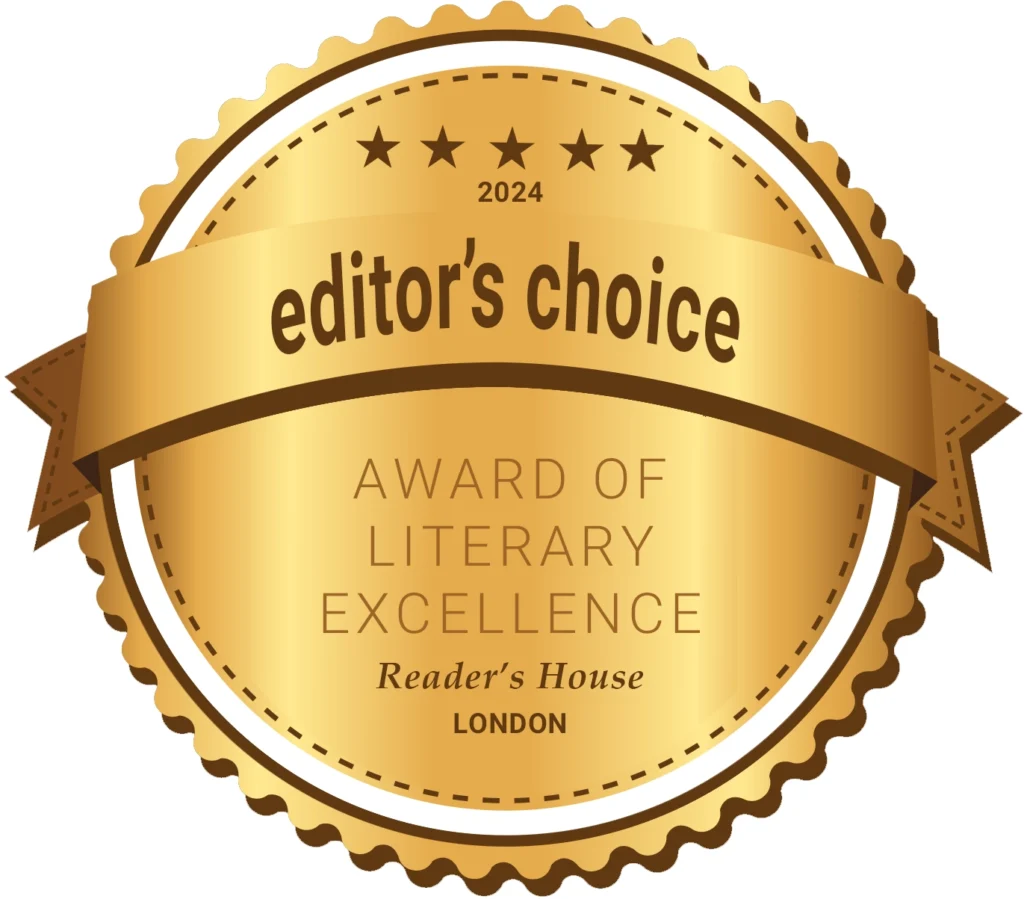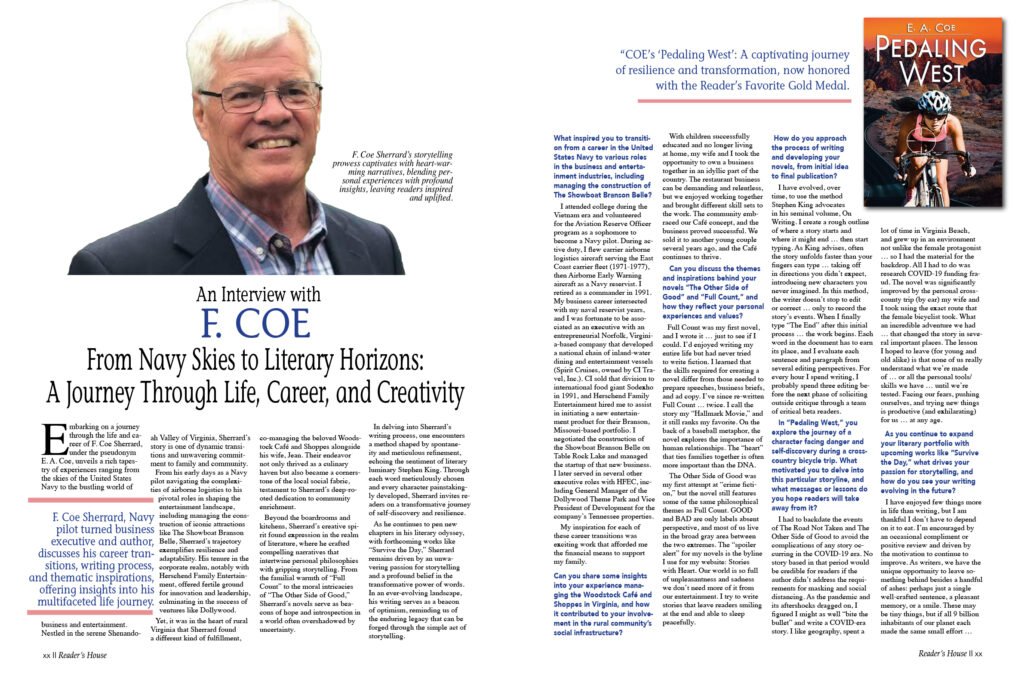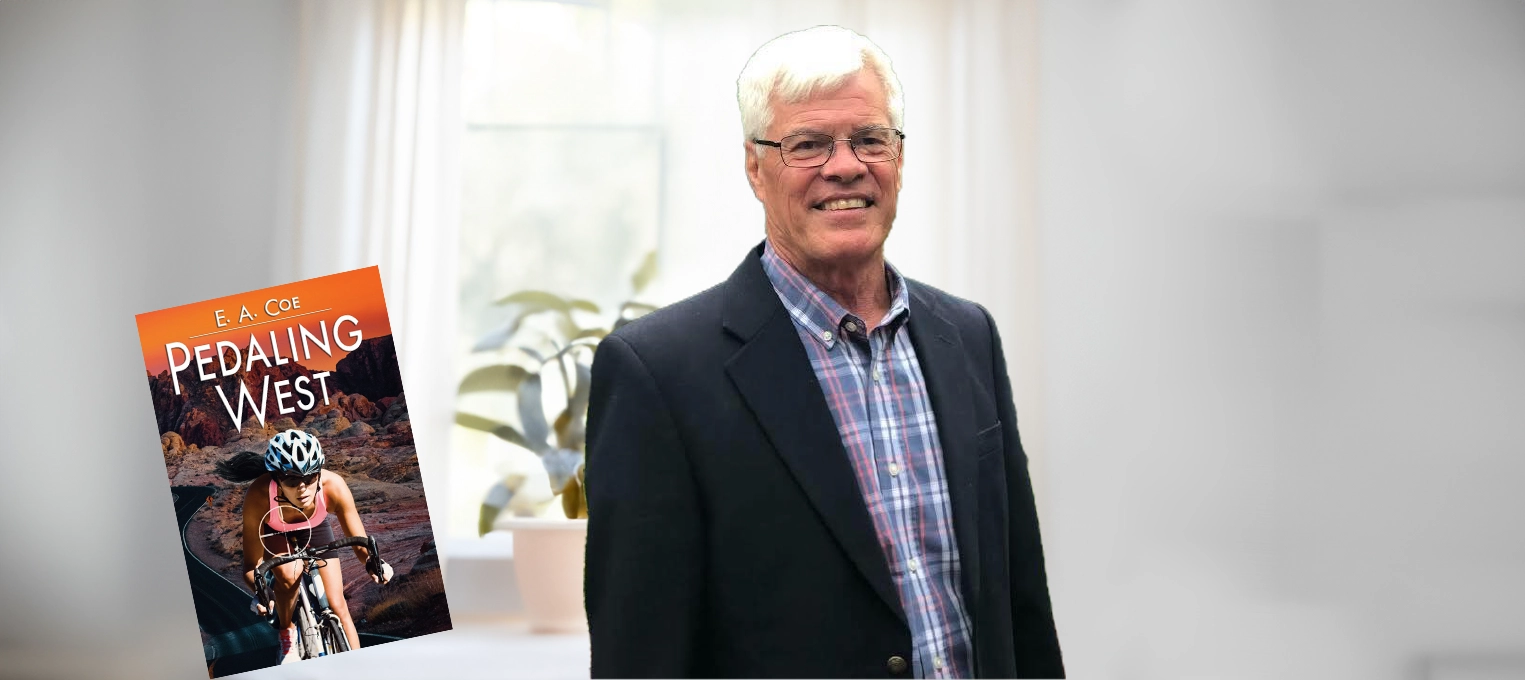From Navy Skies to Literary Horizons: A Journey Through Life, Career, and Creativity
F. Coe Sherrard, Navy pilot turned business executive and author, discusses his career transitions, writing process, and thematic inspirations, offering insights into his multifaceted life journey.
Embarking on a journey through the life and career of F. Coe Sherrard, under the pseudonym E. A. Coe, unveils a rich tapestry of experiences ranging from the skies of the United States Navy to the bustling world of business and entertainment. Nestled in the serene Shenandoah Valley of Virginia, Sherrard’s story is one of dynamic transitions and unwavering commitment to family and community.
From his early days as a Navy pilot navigating the complexities of airborne logistics to his pivotal roles in shaping the entertainment landscape, including managing the construction of iconic attractions like The Showboat Branson Belle, Sherrard’s trajectory exemplifies resilience and adaptability. His tenure in the corporate realm, notably with Herschend Family Entertainment, offered fertile ground for innovation and leadership, culminating in the success of ventures like Dollywood.
Yet, it was in the heart of rural Virginia that Sherrard found a different kind of fulfillment, co-managing the beloved Woodstock Café and Shoppes alongside his wife, Jean. Their endeavor not only thrived as a culinary haven but also became a cornerstone of the local social fabric, testament to Sherrard’s deep-rooted dedication to community enrichment.
Beyond the boardrooms and kitchens, Sherrard’s creative spirit found expression in the realm of literature, where he crafted compelling narratives that intertwine personal philosophies with gripping storytelling. From the familial warmth of “Full Count” to the moral intricacies of “The Other Side of Good,” Sherrard’s novels serve as beacons of hope and introspection in a world often overshadowed by uncertainty.
In delving into Sherrard’s writing process, one encounters a method shaped by spontaneity and meticulous refinement, echoing the sentiment of literary luminary Stephen King. Through each word meticulously chosen and every character painstakingly developed, Sherrard invites readers on a transformative journey of self-discovery and resilience.
As he continues to pen new chapters in his literary odyssey, with forthcoming works like “Survive the Day,” Sherrard remains driven by an unwavering passion for storytelling and a profound belief in the transformative power of words. In an ever-evolving landscape, his writing serves as a beacon of optimism, reminding us of the enduring legacy that can be forged through the simple act of storytelling.
What inspired you to transition from a career in the United States Navy to various roles in the business and entertainment industries, including managing the construction of The Showboat Branson Belle?
I attended college during the Vietnam era and volunteered for the Aviation Reserve Officer program as a sophomore to become a Navy pilot. During active duty, I flew carrier airborne logistics aircraft serving the East Coast carrier fleet (1971-1977), then Airborne Early Warning aircraft as a Navy reservist. I retired as a commander in 1991. My business career intersected with my naval reservist years, and I was fortunate to be associated as an executive with an entrepreneurial Norfolk, Virginia-based company that developed a national chain of inland-water dining and entertainment vessels (Spirit Cruises, owned by CI Travel, Inc.). CI sold that division to international food giant Sodexho in 1991, and Herschend Family Entertainment hired me to assist in initiating a new entertainment product for their Branson, Missouri-based portfolio. I negotiated the construction of the Showboat Branson Belle on Table Rock Lake and managed the startup of that new business. I later served in several other executive roles with HFEC, including General Manager of the Dollywood Theme Park and Vice President of Development for the company’s Tennessee properties.
My inspiration for each of these career transitions was exciting work that afforded me the financial means to support my family.
Can you share some insights into your experience managing the Woodstock Café and Shoppes in Virginia, and how it contributed to your involvement in the rural community’s social infrastructure?
With children successfully educated and no longer living at home, my wife and I took the opportunity to own a business together in an idyllic part of the country. The restaurant business can be demanding and relentless, but we enjoyed working together and brought different skill sets to the work. The community embraced our Café concept, and the business proved successful. We sold it to another young couple several years ago, and the Café continues to thrive.
Can you discuss the themes and inspirations behind your novels “The Other Side of Good” and “Full Count,” and how they reflect your personal experiences and values?
Full Count was my first novel, and I wrote it … just to see if I could. I’d enjoyed writing my entire life but had never tried to write fiction. I learned that the skills required for creating a novel differ from those needed to prepare speeches, business briefs, and ad copy. I’ve since re-written Full Count … twice. I call the story my “Hallmark Movie,” and it still ranks my favorite. On the back of a baseball metaphor, the novel explores the importance of human relationships. The “heart” that ties families together is often more important than the DNA.
The Other Side of Good was my first attempt at “crime fiction,” but the novel still features some of the same philosophical themes as Full Count. GOOD and BAD are only labels absent perspective, and most of us live in the broad gray area between the two extremes. The “spoiler alert” for my novels is the byline I use for my website: Stories with Heart. Our world is so full of unpleasantness and sadness we don’t need more of it from our entertainment. I try to write stories that leave readers smiling at the end and able to sleep peacefully.
How do you approach the process of writing and developing your novels, from initial idea to final publication?
I have evolved, over time, to use the method Stephen King advocates in his seminal volume, On Writing. I create a rough outline of where a story starts and where it might end … then start typing. As King advises, often the story unfolds faster than your fingers can type … taking off in directions you didn’t expect, introducing new characters you never imagined. In this method, the writer doesn’t stop to edit or correct … only to record the story’s events. When I finally type “The End” after this initial process … the work begins. Each word in the document has to earn its place, and I evaluate each sentence and paragraph from several editing perspectives. For every hour I spend writing, I probably spend three editing before the next phase of soliciting outside critique through a team of critical beta readers.
In “Pedaling West,” you explore the journey of a character facing danger and self-discovery during a cross-country bicycle trip. What motivated you to delve into this particular storyline, and what messages or lessons do you hope readers will take away from it?
I had to backdate the events of The Road Not Taken and The Other Side of Good to avoid the complications of any story occurring in the COVID-19 era. No story based in that period would be credible for readers if the author didn’t address the requirements for masking and social distancing. As the pandemic and its aftershocks dragged on, I figured I might as well “bite the bullet” and write a COVID-era story. I like geography, spent a lot of time in Virginia Beach, and grew up in an environment not unlike the female protagonist … so I had the material for the backdrop. All I had to do was research COVID-19 funding fraud. The novel was significantly improved by the personal cross-county trip (by car) my wife and I took using the exact route that the female bicyclist took. What an incredible adventure we had … that changed the story in several important places. The lesson I hoped to leave (for young and old alike) is that none of us really understand what we’re made of … or all the personal tools/skills we have … until we’re tested. Facing our fears, pushing ourselves, and trying new things is productive (and exhilarating) for us … at any age.
As you continue to expand your literary portfolio with upcoming works like “Survive the Day,” what drives your passion for storytelling, and how do you see your writing evolving in the future?
I have enjoyed few things more in life than writing, but I am thankful I don’t have to depend on it to eat. I’m encouraged by an occasional compliment or positive review and driven by the motivation to continue to improve. As writers, we have the unique opportunity to leave something behind besides a handful of ashes: perhaps just a single well-crafted sentence, a pleasant memory, or a smile. These may be tiny things, but if all 9 billion inhabitants of our planet each made the same small effort … what a better world this would be.
EDITOR’S CHOICE
” Gripping adventure, suspenseful twists, and profound character growth make this novel an unforgettable journey of discovery.”
In Pedaling West by E. A. Coe, readers embark on a gripping journey alongside protagonist Carrie Brinkley as she pedals her way from Virginia Beach to Mendocino, California, in a quest for self-discovery amidst the backdrop of a tumultuous pandemic landscape. Coe, crafts a narrative that seamlessly blends elements of adventure, suspense, and coming-of-age themes.





